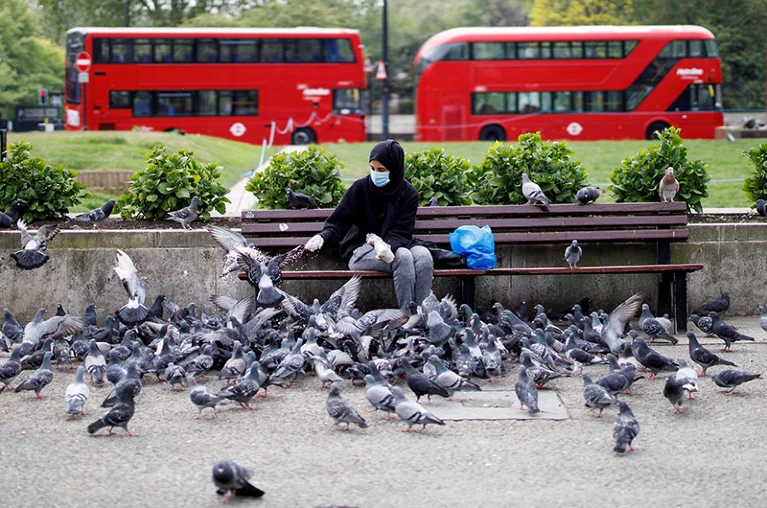
In the United Kingdom, some common bird species were frequent visitors to gardens and parks, whereas others gave those places a wide berth.
Freda Kreier
People weren’t the only ones who changed their ways during the COVID-19 pandemic — birds did, too. Four out of five of the most commonly observed birds in the United Kingdom altered their behaviour during the nation’s first lockdown of 2020, although they did so in different ways depending on the species, according to an analysis.
The study, published in Proceedings of the Royal Society B on 21 September, is one of several that used the disruptions brought about by the pandemic — from a reduction in the number of cars on the roads to the closure of some national parks — to quantify the impact that humanity has on the natural world. Although some research has found that lockdowns had a largely positive effect on wildlife, the latest data from the United Kingdom provide a much more nuanced picture.
“People didn’t disappear during the lockdown,” says co-author Miyako Warrington, a behavioral ecologist at the University of Manitoba in Winnipeg, Canada. “We changed our behavior, and wildlife responded.”
Rare experiment
In the early months of the pandemic, social media was abuzz with reports of wild animals being seen in unusual places. These claims were partially validated when Warrington and her colleagues reported that, in 2020, many bird species in the United States and Canada were spotted moving into spaces usually occupied by people2.
To see how a COVID-19 lockdown affected birds in the United Kingdom, Warrington and her colleagues tallied sightings of the 25 most common birds between March and July 2020 — during the country’s first lockdown — and compared their data set with data from previous years. In total, the study included around 870,000 observations.
The team then compared this information to data showing how people split their time between home, essential shops and parks: three places people in the United Kingdom were allowed to be during the lockdown.
Because people spent more time at home and in parks than before March 2020, the analysis found that 20 of the 25 bird species examined behaved differently during lockdown. Parks — which were flooded with visitors — saw an an uptick in the numbers of corvids and gulls, whereas smaller birds, such as Eurasian blue tits (Cyanistes caeruleus) and house sparrows (Passer domesticus), were spotted less frequently than in previous years. And because people spent more time at home, the number of avian species that visited domestic gardens also dropped, by around one-quarter, compared with previous years.
Other species, including rock pigeons (Columba livia), didn’t react to the lockdown at all. Warrington found this surprising, because pigeons are city dwellers, so she thought they would be affected by the changes in people’s behavior. “But they don’t give a crap about what we do,” she says.
Adapting to change
The birds that altered their habits during the lockdown were probably responding to changes in human behavior, says Warrington. Tits and other birds whose numbers dipped might have fled when people and their pets started spending more time in parks and gardens. The reverse could be true for scavengers, such as gulls and corvids, which might have benefited from park visitors leaving behind rubbish for them to feed on.
When combined with the results of other studies, the behavior of British birds reveals the complex ways in which wildlife was affected by lockdowns and underlines the importance of reducing the disturbance of animals by people, says Raoul Manenti, a conservation zoologist at the University of Milan in Italy.
For Warrington, that means acknowledging that lockdowns were not universally good for wildlife. “Our relationship with nature is complicated,” she says. By developing a better understanding of this relationship, “we know we can affect positive change as long as we do it in a thoughtful manner”.
____________________
Courtesy: Nature (Published on September 28, 2022)